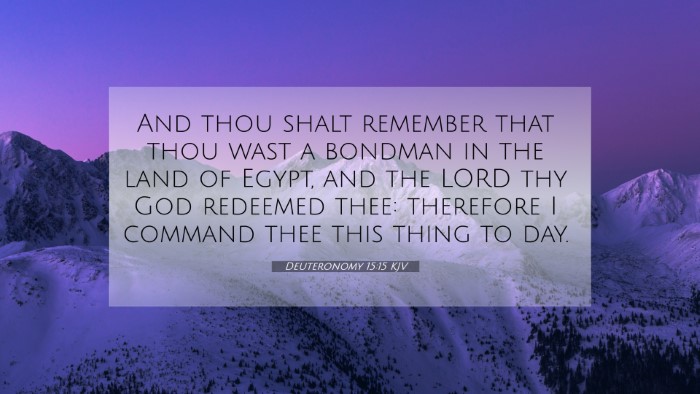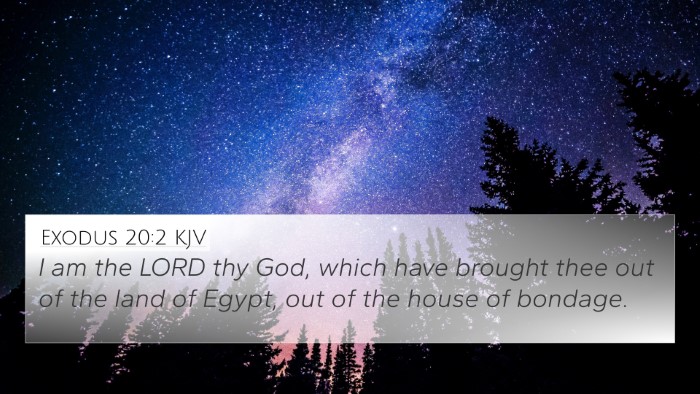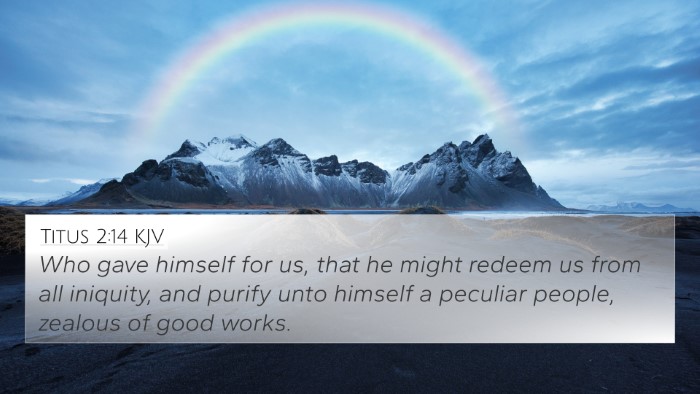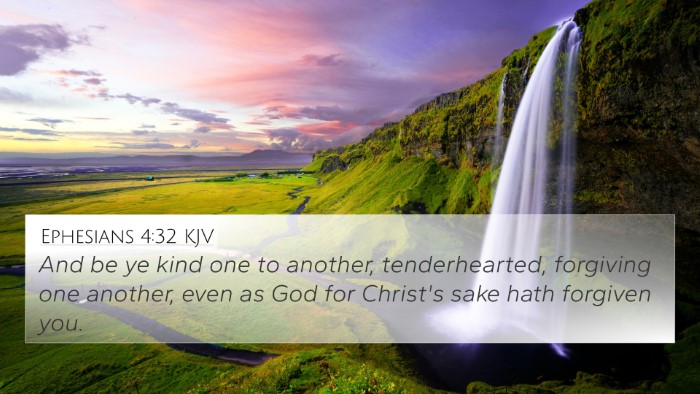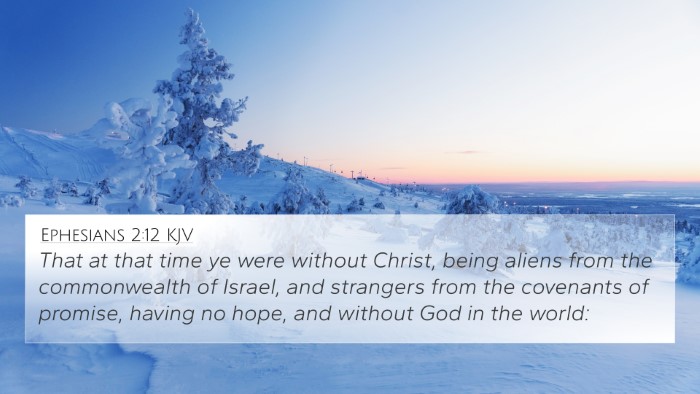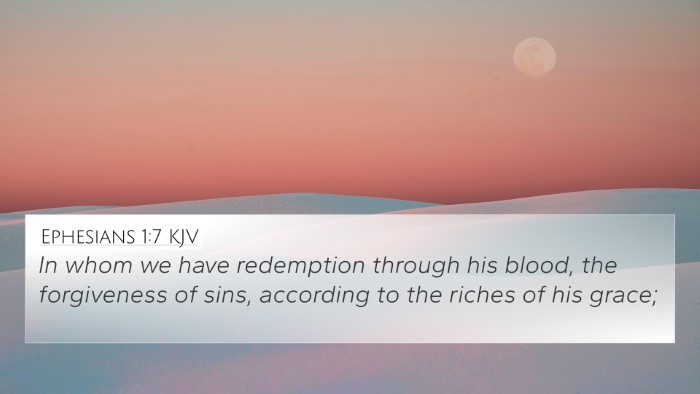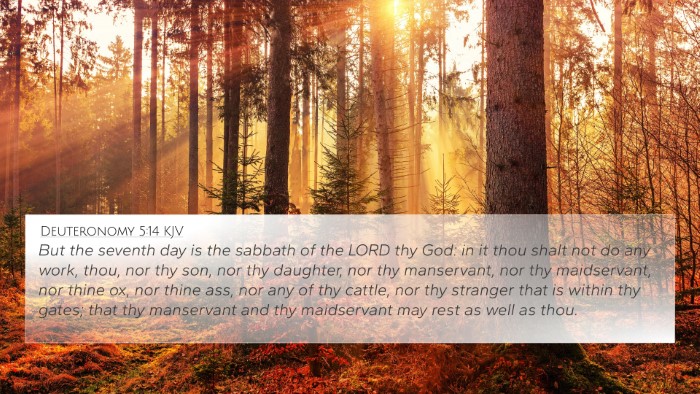Understanding Deuteronomy 15:15
Deuteronomy 15:15 states, "And thou shalt remember that thou wast a bondman in the land of Egypt, and the LORD thy God redeemed thee: therefore I command thee this thing to day." This verse carries profound theological and practical implications regarding mercy, generosity, and the remembrance of God's deliverance.
Key Themes and Insights
- Remembrance of Deliverance: The verse urges the Israelites to remember their past as slaves in Egypt. This serves as a foundational reminder that they were once oppressed but were redeemed by God's mighty hand (Matthew Henry). The act of remembering positions the faithful to act justly and with compassion towards others.
- Divine Redemption: The word "redeemed" signifies God's action in bringing His people out of bondage. This parallels themes found throughout Scripture regarding salvation and redemption, emphasizing God’s mercy and grace (Albert Barnes).
- Call to Generosity: The command that follows in the context of Deuteronomy calls for generosity towards those in need. Understanding one’s own past vulnerability fosters a spirit of compassion (Adam Clarke).
- Social Justice: The verse reflects a commitment to social justice. It reminds the Israelites, and us, of our responsibility to care for the less fortunate, shaped by our own experiences of need (Matthew Henry).
- God's Faithfulness: This verse is a reminder of God's faithfulness throughout Israel's history. It serves to strengthen the believers’ trust in God’s continued provision and promises (Albert Barnes).
Cross-Referencing Biblical Texts
Deuteronomy 15:15 connects to several other Bible verses, highlighting the themes of redemption, generosity, and social responsibility:
- Exodus 20:2: "I am the LORD thy God, which have brought thee out of the land of Egypt, out of the house of bondage." - This verse reinforces the idea of God's deliverance from oppression.
- Leviticus 25:39-43: This passage outlines the treatment of fellow Israelites who fall into poverty, pointing to the ongoing obligation to help those in need.
- Psalms 107:2: "Let the redeemed of the LORD say so, whom he hath redeemed from the hand of the enemy." - A call to proclaim God’s redemptive acts in our lives.
- Luke 4:18: "The Spirit of the Lord is upon me, because he hath anointed me to preach the gospel to the poor; he hath sent me to heal the brokenhearted, to preach deliverance to the captives..." - Jesus claims the fulfillment of redemption and caring for the marginalized.
- 2 Corinthians 8:9: "For ye know the grace of our Lord Jesus Christ, that, though he was rich, yet for your sakes he became poor..." - This verse emphasizes the generosity central to the Christian faith, modeled after Christ.
- Galatians 5:13: "For, brethren, ye have been called unto liberty; only use not liberty for an occasion to the flesh, but by love serve one another." - A directive to use freedom to serve others, echoing Deuteronomy 15:15’s call for compassion.
- James 2:15-16: This passage warns against being indifferent to the needs of others, urging active help for those in need, aligning with the mercy taught in Deuteronomy 15.
- Matthew 25:35-40: In this parable, Jesus discusses helping the least of these as serving Him, consistent with the themes of mercy in Deuteronomy.
- 1 John 3:17-18: This scripture challenges believers not to love in word only but in deed and truth, tying back to the call of Deuteronomy to aid the needy.
Comparative Bible Verse Analysis
The connections between Deuteronomy 15:15 and the aforementioned verses create a rich narrative of God's design for human relationships and society. Each reference reinforces the core message of remembering God’s grace while fostering a culture of generosity. They collectively contribute to a thematic exploration of freedom, redemption, and compassionate living.
To efficiently study these connections, one can utilize Bible reference resources such as a Bible concordance or a Bible cross-reference guide. Such tools offer invaluable assistance for Bible cross-reference study and for identifying connections between Old and New Testaments.
Tools for Bible Cross-Referencing
Engaging in cross-referencing Bible studies allows believers to gain deeper insights into the Scriptures. Understanding how different passages relate enhances our comprehension of Biblical themes. Here are several effective cross-referencing Bible study methods:
- Comprehensive Study Bibles: These often include cross-references within the margins or footnotes.
- Digital Bible Apps: Many applications provide a built-in tool for instant cross-referencing related verses.
- Dedicated Bible Study Software: Tools specifically designed for in-depth study offer extensive configurations for cross-referencing.
- Online Bible Databases: Websites that host digital arrangements of the Bible often include features for navigating linked passages.
Through these tools, individuals can engage in meaningful Bible studies, discovering thematic Bible verse connections and unearthing the spiritual depths of the scriptures. This practice not only enriches personal faith but also equips believers for effective teaching and sharing of God's message.
Conclusion
Deuteronomy 15:15 invites believers to a profound understanding of redemption and the responsibility it entails. The verse’s relevance transcends its historical context, finding vital application in how we engage with the suffering and impoverished in our communities today.
As we meditate on and explore these Bible verse parallels, let us be guided by the grace that invites us to remember our own deliverance and in turn serve others with love and humility.


